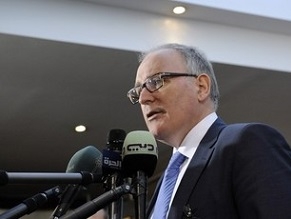|
World Jewish News

Dutch Foreign Minister Frans Timmermans
|
Pro-Israel Holland moves to label settlement produce to avoid 'contributing to the economy of illegal settlements'
11.03.2013, Israel and the World Holland has moved to encourage retailers to specifically label Israeli produce originated from settlements after the Dutch Ministry of Economic Affairs issued a directive last Wednesday calling on Dutch chains to comply with the initiative, which will not be legally binding.
An open letter posted to the ministry’s website stressing the directive was in line with the European Commission’s position, coincided with an address by Dutch Foreign Minister Frans Timmermans to parliament, describing settlements as illegal and an obstacle to peace in the Middle East.
Labelling products from settlements would help consumers make an informed choice about whether to purchase them and thus avoid “contributing to the economy of the illegal settlements,” he added.
The change in policy from close Israeli ally and trading partner the Netherlands closely follows a letter by EU foreign policy chief Catherine Ashton to the 27 EU foreign ministers on February 22 calling on them to review their policy on Israeli settlement labelling with regard to the EU position on the issue.
At a meeting of the EU foreign affairs council last December, Europe’ foreign ministers recalled their controversial conclusions of seven months previously as reiterated “their commitment to ensure continued, full and effective implementation of existing European Union legislation and bilateral arrangements applicable to settlement products”, as the council stressed that all existing trade agreements between the EU and the Jewish State (in light of last year’s eventual passing of the long-delay ACAA trade agreement) “must unequivocally and explicitly indicate their inapplicability to the territories occupied by Israel in 1967”.
Israeli Ambassador to the Netherlands Haim Devon confirmed he had approached senior Dutch foreign ministry officials in the aftermath of Ashton’s incendiary directive stressing the Israeli foreign ministry’s own view that inviting retailers to voluntarily label settlement produce would inevitably lead to a boycott on such products and. Potentially, Israeli produce in general. Divon claimed the directive would inevitably be misinterpreted as legally binding, forcing the hands of many retailers, concluding it demonstrated that “obsessive preoccupation with the settlements had exceeded all proportion” and that “the European Union is taking out its frustration with the situation in the Middle East on us”.
The Netherlands is by no means the first EU member state to move to reassess its position on labelling settlement produce, after the British government likewise issued a recommendation and Denmark last year advocated a ban on labelling settlement produce as a product of Israel. Despite look into the matter, however, the Danish government has yet to take concrete action on pursuing a ban. Divon revealed the Dutch foreign ministry had assured him they would not be pursuing a ban.
The news will be unlikely to placate Israeli authorities, who have consistently relied on the Netherlands as a key ally amongst often hostile EU member states, as well as a leading European trading partner.
Last June the Dutch Minister for Economic Affairs, Agriculture and Innovation Maxime Verhagen led a 60-strogn Dutch business delegation to Israel to launch a new scheme promoting the strong bilateral trading partnership between the Netherlands and the Jewish State, as the director of the scheme, the Innovation Advisor for the Economic Section of the Netherlands Embassy in Tel Aviv Paul Jansen concluded that Israel and Holland were “good for each other”.
A month previously, Holland was one of only two European countries to intervene to moderate the tone of the contentious May EU foreign affairs council conclusions, as a report by Israeli daily The Jerusalem Post claimed that Dutch officials, in conjunction with their Italian counterparts, “made sure that certain element favourable to Israel, such as references to Palestinian incitement and Israel’s security needs, were inserted”.
Holland has also consistently supported Israel in international forums, such as UNESCO, where it opposed the admission of Palestine, and the UN General Assembly, and often speaks in Israel’s defence in internal EU meetings. The Netherlands delegation voted to abstain from last November’s vote on Palestinian Authority non-member observer status at the UN General Assembly, along with fellow Israeli allies Germany, the UK, Bulgaria and Poland.
Explaining his country’s decision, the Dutch delegate, said his country supported EU rhetoric on the issue, as well as a peace agreement based on the borders of 1967, with a viable independent State of Palestine and a secure State of Israel living side by side in peace and security. “The current status quo is untenable,” he said in that regard. The Netherlands supported Palestinian efforts to achieve statehood, but would have preferred the resolution to be postponed, as it could threaten negotiations at this time. For that reason, the Netherlands had decided to abstain in the vote. It stood ready to support negotiations, and would support both parties bilaterally, taking into account Palestinian aspirations for statehood and Israel’s need for security. He urged all parties to refrain from actions that undermined the prospect of a two-State solution, and particularly urged Israel to end its settlement activities.
The Netherlands is the only EU member states to designate Hezbollah, the Lebanese Shiite group, as a terrorist organisation in its entirety, as calls continue to mount from Israel and the US for the EU as a whole to act likewise in the wake of Bulgaria’s findings of Hezbollah culpability in a fatal attack on Israeli tourists last July in Burgas.
Britain has outlawed only Hezbollah's military arm, but not its political arm which is part of the governing Lebanese coalition.
In 2011, Holland exported goods to the value of €1 billion to Israel and imported €2.1 billion worth of Israeli goods, making the Netherlands Israel’s second largest export destination in Europe.
EJP
|
|
